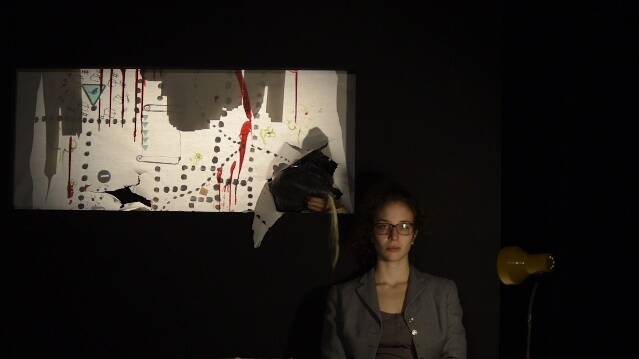The Shortest and Sweetest of Songs



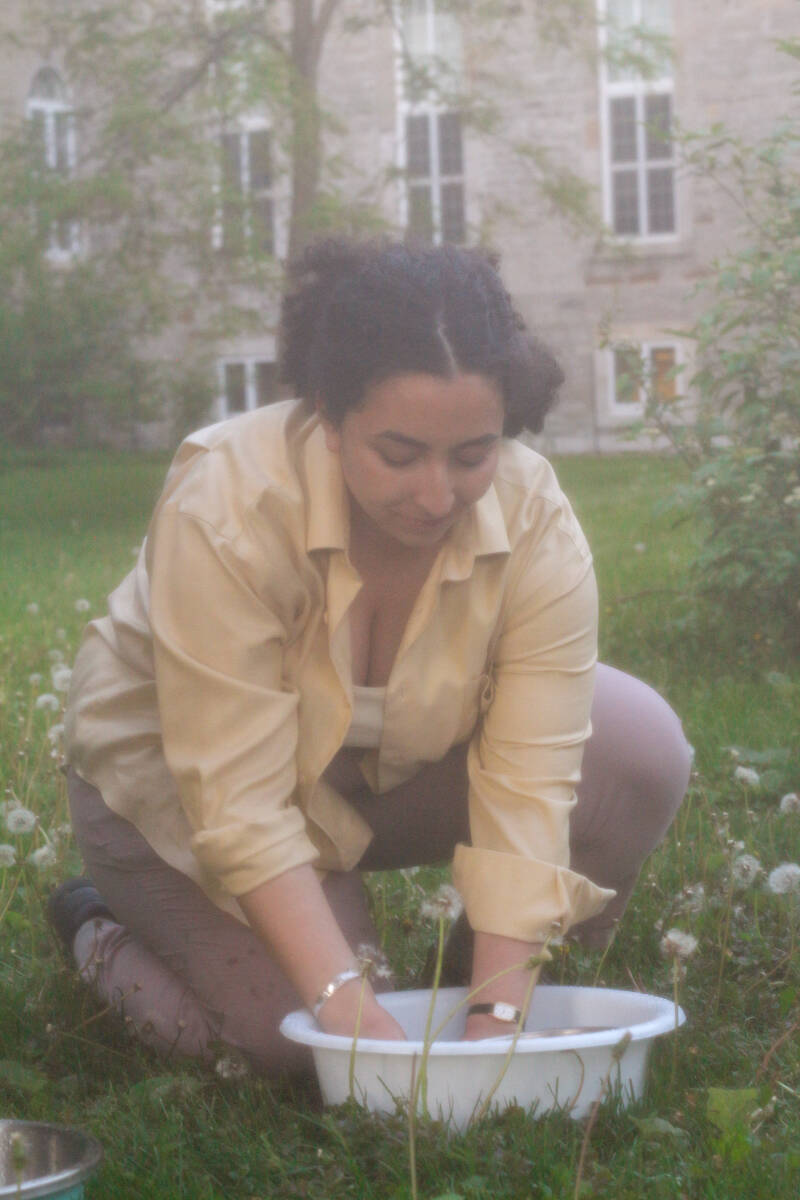
Presented in Teesri Duniya’s outdoor performance space, The Shortest and Sweetest of Songs is an experiential collage of poetry, puppetry, music, and live performance—an embodied exploration of hope and home in Palestine. Featuring a vibrant ensemble of puppeteers, actors, musicians, and performance artists, this multidisciplinary piece invites audiences into a shared space of reflection and resistance. Rooted in Palestinian poetry and intergenerational dreams of return, the performance unfolds as a living tapestry of sound, image, and movement—an act of remembrance, resilience, and radical imagination.
Montag, Dienstag, Waschtag - normal is just a cycle on the washing machine
Ein materiales Musiktheater mit Waschmaschinen, Klavier und Waschzubehör
von und mit relevanzkollektiv
für Menschen ab 14 Jahren

Was machen wir wenn die Waschmaschine läuft? Kaffee trinken? Ein Buch lesen? Musik hören oder machen?
Arbeiten? Carearbeit? Lohnarbeit?
Die elektrische Waschmaschine ist die Erfindung der industriellen Revolution, die die meiste Arbeitszeit freisetze, weibliche Arbeitszeit wohlgemerkt. `normal is just a cycle on the washing machine` will Dimensionen weiblicher Arbeitskraft reflektieren und sich im Herstorytelling üben - auf der Bühne Waschmaschine und Zubehör, 4 Performerinnen und ein Klavier. Zu Musik von Julia Perry und anderen Komponistinnen des 20. und 21. Jahrhunderts, sowie Klängen von Waschmaschinen und Waschutensilien, verhandelt die Performance kulturelle Bedeutungen des Waschens und stellt Fragen ob der Möglichkeit der weiblichen Befreiung durch Technik.
Idee&Konzeption: Tanja Höhne
Performance: Xdzunúm Danae Trejo, Anna Renner, Tanja Höhne
Klavier: Idith Meshulam Korman

Folkosis- A Performative Dispute on the Politics of Inspiration
A wild and a crazy body meet and merge into a template. The performers dance their cultural and mental identities into place. They draw their energy from the fascination for the free, irrational and radically poetic behind their sources of inspiration. But how far can this process between imitation and irritation be taken?
Based on the manifesto text "Anticultural Positions" by the founder of Art Brut, Jean Dubuffet, a performative confrontation develops around the longing for the original.
Artistic director Markus Posse Choreography Markus Posse, Andrea Krohn Stage & object theatre Tanja Höhne Text hn. lyonga Performance Andrea Krohn, hn. lyonga, Markus Posse, Tanja Höhne
Supported by the Fonds Darstellende Künste with funding from the Federal Government for Culture and the Media within the framework of NEUSTART KULTUR.
https://ackerstadtpalast.de/en/folkosis-a-performative-dispute-on-the-politics-of-inspiration
Finished Waiting

photo: Greg Cookland
Finished Waiting, a new show created this winter by B&P director, Peter Schumann and the storied Vermont troupe of puppeteers, carpenters, bus drivers, musicians, dancers, agitators and bread-bakers – many of whom do all of the above in the process of inventing Bread & Puppet's aesthetically iconic and politically plainspoken shows and bringing them to audiences far and wide.
Finished Waiting is a show for this moment of political, social, ecological and epidemiological rupture and uncertainty, a moment in which many feel the seduction of a stance of waiting: waiting for the pandemic to be over, for better leaders to be elected, for actions to be taken by the powerful to respond to ecological catastrophe, for families to be reunited or seemingly eternal wars to end.
What do we do and where do we go when we're finished waiting? What transformations might be possible in our lives and in our politics if we stopped waiting for them to change, or for others to change first? How is it possible to recognize the moment in which we can set waiting aside and set out toward something – and, as importantly, how can we recognize the moment in which we can, at last, lay aside cherished innocences or bootless hopes, see what is for what it is, and act accordingly? How can it become possible for us to arise together and promote the arising of new worlds of collective possibility through collective uprising?
Bread & Puppet foments such practices of rising in the provocatively quotidian terms of "Domestic Resurrection" – under the banner of which aesthetic and spiritual sublimity are not at odds with political stridency and the rigors of traditional household chores.
In Finished Waiting, Bread & Puppet invites audiences throughout the Northeast to harken to these practices of uprising, and take heart from them – as we all participate in the satisfaction of another, equally fundamental kind of waiting: the waiting for spring's arrival after a long winter. With this show, Bread & Puppet seems to call on us to recognize how nature itself shows us what is possible and what can arise, when we abandon waiting and embrace transformation.
Mutterwerk
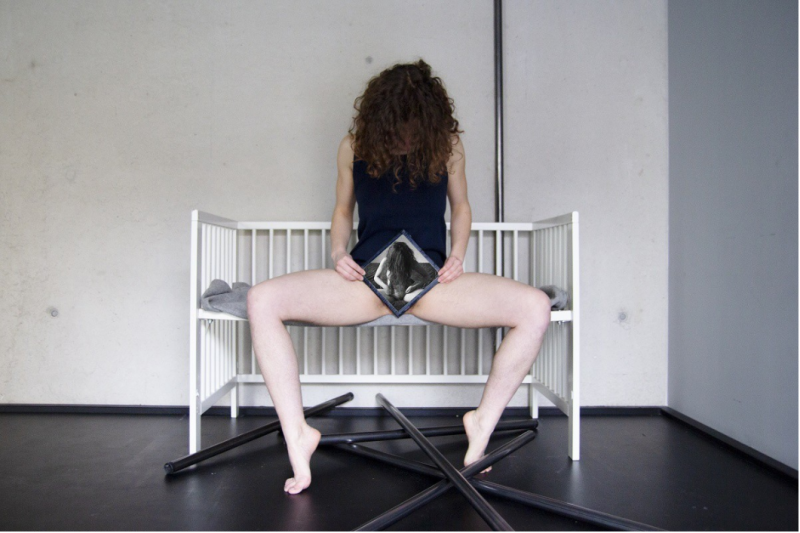
photo: Tanja Höhne, Anna Renner, Olivia Ronzani
MUTTERWERK führt die Zuschauenden in einen Rundgang, der bei Klyteimnestras entfesselter Wut beginnt, der auf Erziehungsmethoden der NS-Zeit und deren Folgen zurückschaut und der schließlich Frauen zuhört, die Stellung beziehen, zu sich als Frau, Partnerin und Mutter. Eine audiovisuelle Installation zwischen Dokumentation und Inszenierung.
Eine Arbeit von Anna Renner mit Unterstützung von Olivia Ronzani (Szenische Begleitung), Tanja Höhne (Dramaturgie), Johannes Kühn (Sound-Begleitung) und Felipe dos Santos Boquimpani (Lichtkonzept). Mit Ursula Maurer, Jessica B., Dörthe Krohn, Joyce C., Cathleen, Luciana M., Arzu Ergün-Demir, Moni Schumm und anderen.
ALICE- Lost and Found
Vom Suchen und Finden - Wer verloren geht, muss gefunden werden oder sich selbst wiederfinden.
Alice wer? Kennt ihr Alice? Ja genau, die, die im Cyberwunderland verlorengegangen ist. Könnt ihr sie wiederfinden? Keine Sorge, das weiße Kaninchen hilft euch und auch der verrückte Hutmacher, der Faselhase und die Herzkönigin geben euch Hinweise und außerdem habt ihr ja noch euer tolles Team dazu. Ach, und wo ist eigentlich die Maus?
ALICE - lost and found ist ein Live-Event auf Zoom, das Motive von Alice im Wunderland als escaperoom-Spiel inszeniert. Rätsel müssen gelöst, Hinweise gefunden und zusammengesetzt werden, um am Ende Alice zu finden, die in den Unweiten des Internets abhanden gekommen ist. Wir spielen also, miteinander, mit der Geschichte, mit den Möglichkeiten, die Zoom bietet und mit Figuren.
ALICE - lost und found richtet sich an Kinder im Gundschulalter und deren Familien.
Lasst euch vom weißen Kaninchen in eine Welt voller Verrücktheiten entführen. Mit Köpfchen, guten Augen und einer Portion verrückter Kreativität könnt ihr bestimmt Alice Weg entschlüsseln und sie finden.
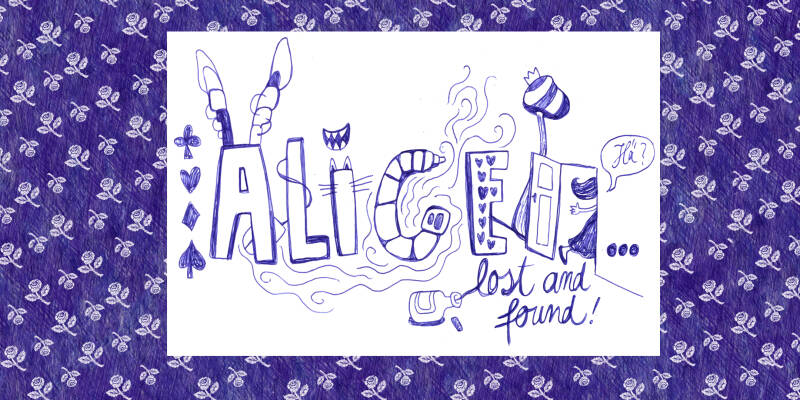
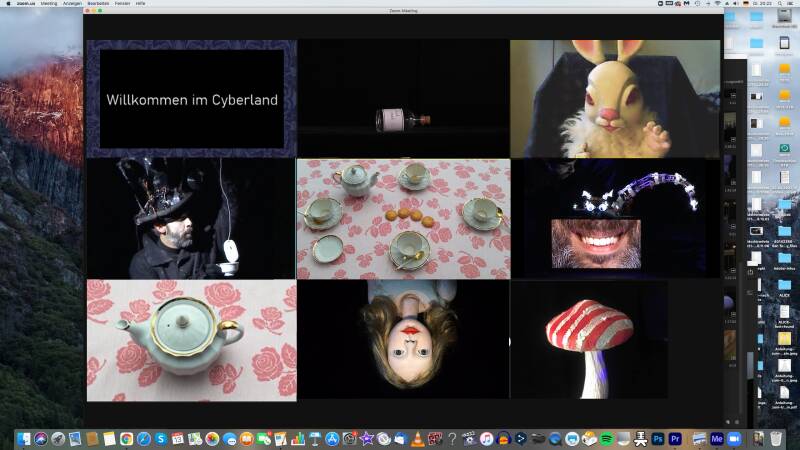
The Honey Let's Go Home Opera
The Honey Let’s Go Home Opera is a fantasy on flatness that takes cardboard as its muse and prime material.
In Honey, cardboard is bent, rolled, stapled, and vividly painted by Peter Schumann to create the precarious, exuberant costumes of the soloists, who celebrate the fact that “only flatness can save you” on a melody from Mozart’s Don Giovanni. The chorus dresses in monochrome primary colors — some all red, others all blue or yellow — and operates flat cardboard puppets of the tools used to manipulate cardboard — a stapler, a pair of pliers, a box-cutter — as well as other basic cardboard objects — a goose, a bicycle, a cup and saucer.
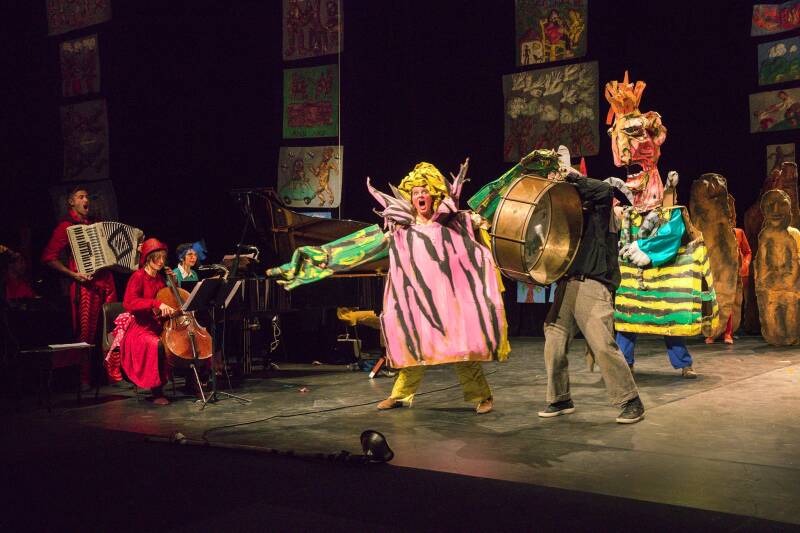


The Basic Bye Bye Show
The Basic Bye-bye Show is a series of quiet object fantasies in black, white, and grey inside a small fabric stage printed with elementary words — “Resist,” “Bread,” “Yes,” “Sky,” “Riot,” “Byebye.”
Bread & Puppet’s director, Peter Schumann, says of the show: “The Basic Bye-bye Show is based on the fact that our culture is saying its basic bye-bye to Mother Earth by continuing the devastating effects of the global economy on our planet.”

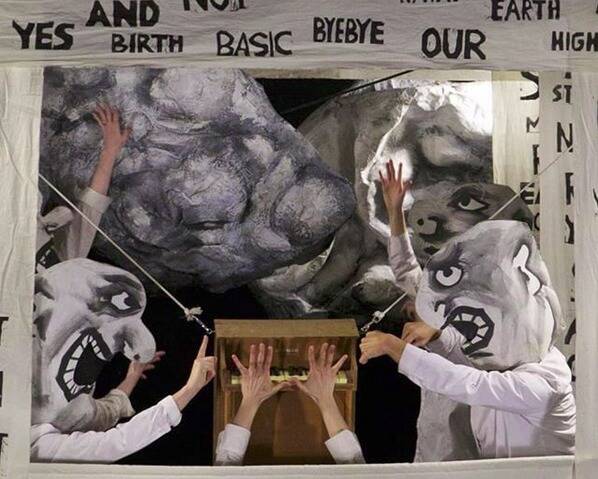
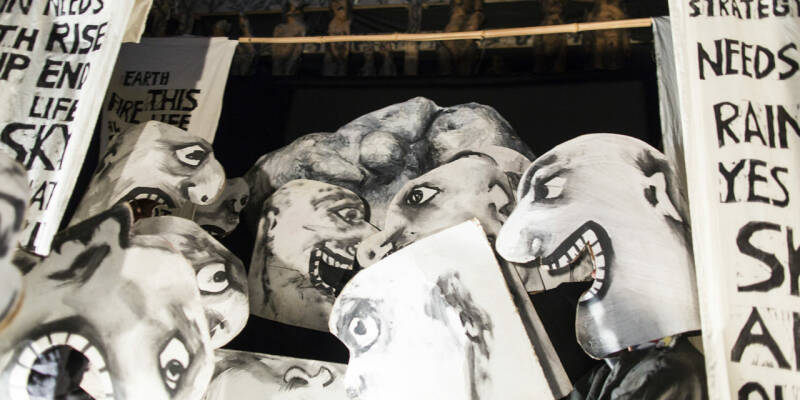

Herr Eichhorn und der erste Schnee
Ein Figurentheaterstück für Kinder ab 4 Jahren, nach dem Bilderbuch von Sebastian Meschenmoser
Wer kennt es nicht das Warten auf den ersten Schnee im Winter?
„Der Winter ist wunderschön“, hat der Bock Herrn Eichhorn erzählt. „Es fallen Schneeflocken aus dem Himmel und alles wird weiß“.
Deshalb beschließt Herr Eichhorn in diesem Jahr auf die erste Schneeflocke zu warten. Kein leichtes Unterfangen für ein Eichhörnchen, das es gewöhnt ist Winterschlaf zu halten. Jeden Winter hat Herr Eichhorn bisher verschlafen, doch dieses mal muss er wach bleiben, um die erste Schneeflocke ja nicht zu verpassen. „Aber der Winter lässt sich Zeit ...“ Herr Eichhorn ist gezwungen den Winterschlaf zu besiegen. Gemeinsam mit Igel und Bär begibt er sich auf eine abenteuerliche Suche nach der ersten Schneeflocke.

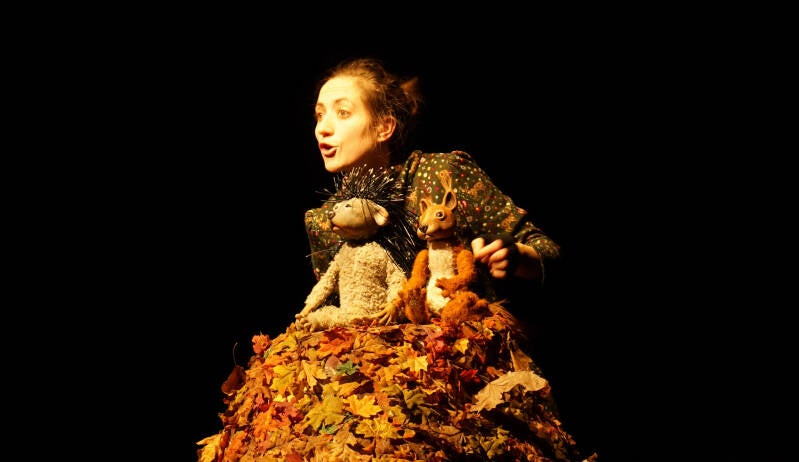


Scribo Ergo Sum
Der Ameisenzyklus
